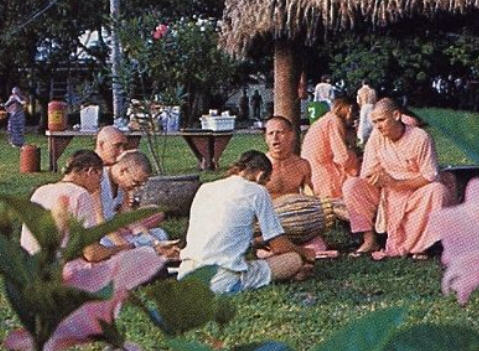A brief look at the worldwide activities of the International Society for Krishna Consciousness
Floridians Feel Good About ISKCON's Farm

Even me residents of South Honda, who are long familiar with exotic tropical vegetation, have never heard of the Jobaticaba tree (which produces grapes directly from its bark) or the star apple tree (whose fruit tastes just like a blue-berry sundae). Yet there they are, right on an 8.5-acre estate that fifty hardworking devotees have transformed into a tropical paradise.
And there is much more at New Naimisaranya Forest (named after a pilgrimage site in India) to delight the people of semisuburban Coral Way, near the Everglades. The devotees have put in over five hundred banana trees (including special Mysores and Raja-puris imported from India), three hundred rose bushes, fifty dwarf Puerto Rican plantain trees, a full three acres of stunning yellow and orange marigolds, plus pink and yellow frangipani, super-fragrant night-blooming jasmine, gardenias, and hibiscus. They have also planted stands of litchi nut, lime, and pineapple trees, as well as papaya, fig, eucalyptus, tamarind, and others too numerous to mention.
Perhaps the most popular features, though, are the thirty-eight beehives and the mango orchard. With an abundance of flowers to choose from, the bees are busy all year round. The devotees bottle the flood of honey, put their own New Naimisaranya Forest label on the bottles, and sell or give most of the bounty to neighbors or guests. Even more popular are the delicious mangoes, which the devotees harvested by the hundreds this year.
When devotees first began developing the farm, under the guidance of temple president Narahari dasa, the neighbors were pleased to see the wonderful transformation of the abandoned estate. They eagerly offered various kinds of help, such as plowing up the future marigold field with a tractor-pulled disker and advising the devotees on planting techniques. Now many local children love to visit "the Hare Krsna farm." They come, mostly on horses or ponies, to swim in the lake and get refreshments.
The neighbors also appreciated that the devotees helped to keep a proposed shopping center out of the area. At a critical meeting of the local civic association, of which New Naimisaranya Forest is now an honorary member, a representative of the prospective developer contended that not a single landowner on Coral Way opposed the shopping center. At that point the neighborhood representative literally jumped out of her seat with a letter from the devotees saying that they were one of the biggest landholders on Coral Way, and that they were strongly opposed to the shopping center.
The plans were shelved, to the great glee of the neighbors, and now they're supporting the devotees' effort to get a rezoning for widening the farm's programs. Said Terry Skinner, president of the civic association, "The devotees are doing a wonderful job developing and beautifying their property, which is becoming a great asset to the community."
Historian Hails Sri Isopanisad
Dr. Thomas N. Pappas, professor of history at Anderson College, has this to say about the Bhaktivedanta Book Trust edition of Sri Isopanisad:
"The first available English edition of Sri Isopanisad makes this most significant publication accessible to a broader public of students and scholars. This spiritual lawbook, with a most useful introduction by His Divine Grace A.C. Bhaktivedanta Swami Prabhupada, is a necessary supplement to any serious study of Vedic culture. The Sanskrit diacritical equivalents and the glossary are most useful guides to further study and deeper understanding of ancient spiritual law and Vedic culture.
"I recommend this volume to any student or scholar of Vedic thought. To the generalist and specialist alike it will generate considerable provocation and understanding. It is an indispensable addition to any serious library collection."
